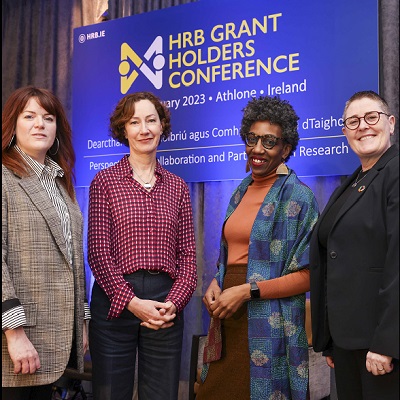Pipework and smoothies – perspectives on collaboration and partnership in research
Our latest blog sees science writer Dr Claire O’Connell recap on the Health Research Board (HRB) Grant Holders Conference 2023: “Perspectives on Collaboration and Partnership in Research. Reflecting on the practice and importance of successful inter & transdisciplinary, collaborative research.”
6 min read - 23 Mar 2023

‘Ní neart go cur le chéile.’ The Irish phrase that there is no strength without unity is particularly relevant in health and social care research. For people, societies, and economies to benefit, those with various backgrounds of training, expertise and lived experience need to work together in an open, trusting environment.
That’s why the HRB has increased its focus on funding multi-disciplinary, collaborative partnerships in health and social care research. And at the HRB Grant Holders Conference in February 2023, delegates got to grips with some of the hurdles and potential solutions to making this work.
Memorable moments and crucial conversations
From colourful analogies of different types of collaborations – is it a fruit salad or smoothie? – to the perils of clogged pipework in research systems and numerous calls for unique health identifiers, the conference created many memorable moments and sparked crucial conversations.
Welcoming participants to the in-person meeting in Athlone, HRB Chief Executive Dr Mairéad O’Driscoll spoke about how recent years have seen the HRB support changes to the size and nature of research teams, with new roles and partnerships developing, sometimes across geographical borders and often involving knowledge users such as patients.
As Dr O’Driscoll put it succinctly:
“We can’t move forward on any issues if we can’t work side by side with others as well.”
Interdisciplinary and knowledge approaches
The first section of the conference looked at adopting interdisciplinary and knowledge approaches in health research.
Dr Isabel Fletcher from the University of Edinburgh described an EU-funded project, SHAPE-ID, that explored ways to improve interdisciplinary co-operation. The project encountered some vexing questions along the way, such as how to define interdisciplinarity and how to integrate information and perspectives. The project compiled top tips for collaborative partnerships, including not always meeting at an academic institution, and a series of questions that are useful to reflect on at the beginning of a project.
Collaborative research partnerships
HRB grant holders then reflected on their experience of running collaborative research partnerships.
Professor Gary Donohoe from the University of Galway spoke about the doctoral programme in youth mental health leadership, which trains participants from disciplines including psychology, psychiatry, occupational therapy and social work. He compared it initially to the Tower of Babel, where everyone spoke different languages. However, by focusing on impact and working together on case studies, the students learned to understand each other’s perspectives, noted Prof. Donohoe.
He also described how one of the trainees devised an analogy for different types of discipline mixing in collaborative partnerships. In the multi-disciplinary fruit bowl, everyone stayed in their lane, in the interdisciplinary fruit salad, chunks of different fruits mingled together, and the truly transdisciplinary project became a blended fruit smoothie.
Building trusted relationships
Professor Jonathan Drennan from University College Dublin spoke about building trusted relationships with hospital and nursing home staff in a project to determine the appropriate nursing staffing and skills mix to meet patient needs. Dr Drennan encouraged researchers to build relationships with knowledge users and to find “hinge actors” who can communicate across spheres, and to provide policymakers with timely access to good quality evidence.
Professor Molly Byrne from the University of Galway described research that looked at how HSE staff engaged with the ‘Making Every Contact Count’ training programme, to promote healthy behaviours among people with chronic disease. Professor Byrne noted the power of in-person workshops and clear pathways for dissemination of the results.
The future of data collaboration
Switching to the future of data collaboration, Dr Sarah Craig, Head of the HRB’s National Health Information Systems, spoke about the impending European Health Data Space, how it could benefit researchers, and how the HRB is preparing in Ireland. She stressed the urgent need in Ireland for health identifiers, to enable linkage of data.
HRB grant holders then shared their own experience of secondary health data analysis in Ireland.
Professor Austin Stack from the University of Limerick highlighted the lack of useful data about chronic illness in Ireland and the impending burden of chronic kidney disease:
“We can remote monitor astronauts, remote operate with robots, but we don’t have simple answers, simple metrics in chronic disease,” he said, stressing the need for electronic health records to maximise the benefit of health and social data and tracking patient journeys.
Dr Gráinne Cousins from RCSI University of Medicine and Health Sciences agreed that we are going nowhere without data linkage and spoke about her research to measure dependence on prescription drugs. She called out the need for high quality, linked datasets and trusted relationships and biostatisticians, all mapping back again to that need for a unique health identifier.
How could we learn from other jurisdictions? Dr Frances Burns from the Northern Ireland Trust Research Environment spoke about moves in Northern Ireland to create a trusted environment for health data, ensuring safety and building trust with the public, and pointed to countries that have more fluid health data access, such as Estonia and Finland.
Winner of the HRB Impact Award 2023
Just ahead of the conference dinner, a world-food buffet that encouraged mixing and conversation, the winner of the HRB Impact Award 2023 was announced: Professor Orla Hardiman from Trinity College Dublin, who has epitomised positive collaboration in her work on the progressive neurological condition ALS.
Day two
After an early ‘Stretch and Start’ session attended by those who had set their alarms, the second day of the conference kicked off with a resonant keynote from Dr Karen Salt of the University of Nottingham about ‘Pipework’.
Pipework? The operations such as HR and finance and management that keep research system flowing. It’s the kind of thing that, like the plumbing or electricity, you probably only notice when something goes wrong. Dr Salt stressed how difficult it can be for institutions to fit some partners into collaborative research relationships, and how damaging it can be for working relationships when the pipes clog or workarounds fail and, for example, invoices aren’t paid on time.
The final round-up
Following a round-up and insights from Dr Teresa Maguire, the HRB’s Director of Research Strategy and Funding, delegates were organised into round tables and came up with topics for the final panel discussion. ‘Tackling the overall question ’Working together for innovation and impact – are we there yet?’, panelists with expertise in medicine, research, innovation and policy discussed public-private partnerships, the need to build overarching frameworks and skills, reform of research ethics approvals, the importance of resourcing such work and how having a cross-cutting ‘Department of linked-up thinking’ could help facilitate research and innovation.
ENDS
Find out more about the HRB Grant Holders 2023 conference on our dedicated website section, which includes links to video recordings on our YouTube channel.
Follow the author of this blog, Claire O’Connell, on Twitter. @claireoconnell
6 min read - 23 Mar 2023



